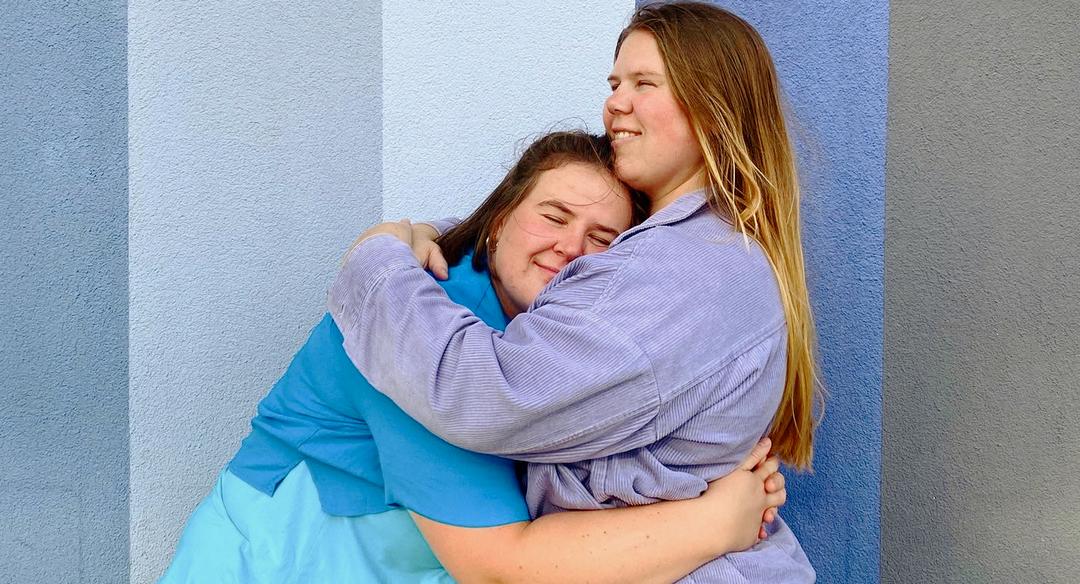DOCUMENTARY
“Sisters love forever”
Premiere in cinemas on Friday 12 April
Norway. 15 years. Director: Sigve Endresen
With: Wilde Siem, Marin Siem, Guri Barka
Marin Siem has been planning to take her own life since she was a teenager. When she finally does in 2022, on her birthday, she has apparently endured a double-digit number of years of overtime, primarily to spare her family, and especially older sister Wilde, from what she understands will be an insane amount of grief.
Marin eats one last meal at McDonald’s, vacuums the apartment so that it will be more “cozy” to empty it after she is gone, and says goodbye to her sister, who is fully aware of what is to come (the two have collaborated on the speech Wilde will hold at the funeral).
SISTERS AND BEST FRIENDS: Marin (left) and Wilde Siem in “Sisters love forever”. Photo: Norwegian Film Distribution
The camera is on when Wilde gets the message. Marin was found in his bed at home. She turned exactly 29 years old.
Early on in “Sisters love forever” we learn that Wilde is no stranger to depressive periods either. But they are clearly not as deep and complicated as my little sister’s, who has often, ever since she was young, fallen into “the black hole”.
Marin was diagnosed with bipolar disorder. Beyond that, this film is sparse with information about her life course.
We learn that the parents are divorced, but cannot readily assume that this contributed to the deterioration of her mental health. We hear that she had a good period when she lived abroad, in South Africa, but cannot know if it would have been better for her if she had stayed there.
AND LIFE MUST GO ON: Martha Leivestad, Wilde Siem, Guri Barka and an unnamed friend in “Sisters love forever”. Photo: Norwegian Film Distribution
Because who can know anything about how another person experiences the world and life in it. On her cellphone, Marin had a photo of herself and Wilde, taken with a filter that made their faces look comically distorted. Marin laughs out loud every time she sees her sister with this face, which can look like a nightmare vision of the painter Francis Bacon:
“It’s like watching Wilde with my depression – for 20 seconds,” she laughs. The father tells of one morning when Marin woke up and everything had seemed fine – yes, indeed bra. Beyond these 15 seconds, the daughter claims to be believed when she says that “there is nothing in me that wants to live”.
Endresen takes us into Wilde Siem’s life six months after her suicide (she herself is credited for the “screenplay”). The older sister is worn out with grief, put on medication that makes her tired in the morning, but endowed with a dark sense of humor – an ability to joke about the most terrible things – that gets her through the days.
Marin had the same ability. We see that in the video recordings the two sisters took in the months before the action (which apparently took place before the veteran documentarian Sigve Endresen entered the picture).
THOSE WHO REMAIN: “Pappa Siem” and Wilde in “Sisters love forever”. Photo: Norwegian Film Distribution
It can be difficult to see that a person is suffering. Marin could smile and laugh. So “perfectly normal” out. It is difficult, sometimes impossible, to help an adult person in serious difficulties. Wilde tried and tried.
De to was “our family,” she says. Now she wonders if Marin “lived for my sake” – implicitly: for too long – and if she used her little sister’s illness as a “pretext not to take her own life”.
The psychologist she says this to is the only health worker to be seen in “Sisters love forever”. There are no other professionals involved, no talking heads, little statistics and no moral or otherwise admonishing pointing fingers.
TO KEEP FLOATING: Wilde Siem in “Sisters love forever”. Photo: Norwegian Film Distribution
Wilde says she will use the filming as “therapy”. Endresen digs very little into the family and illness history, does not launch any “solutions”. Doesn’t seem to be very concerned about whether this “could have been avoided”. The film leaves it to us, the audience, to think about the fundamental, enormously complex theme.
“Sisters love forever” is unartistic, bordering on unbearably restrained and uninformative. We humans will preferably to be served explanations – even in the face of things that are difficult to explain. The film is primarily addressed, I think, to survivors who have found themselves in roughly the same terrain as Wilde Siem.
Some will probably think that it is “irresponsible” that “Sisters love forever” was made at all. To them, just say: Serious mental disorders with suicide as a result do occur. What is irresponsible is to does not talk about it.
Need someone to talk to?
Sea view
